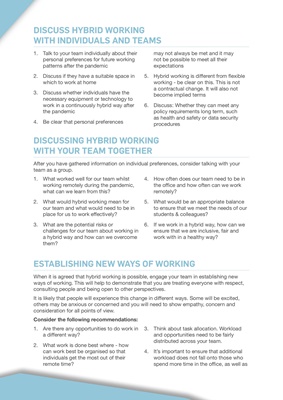
DISCUSS HYBRID WORKING
WITH INDIVIDUALS AND TEAMS
1. Talk to your team individually about their
personal preferences for future working
patterns after the pandemic
2. Discuss if they have a suitable space in
which to work at home
3. Discuss whether individuals have the
necessary equipment or technology to
work in a continuously hybrid way after
the pandemic
4. Be clear that personal preferences
may not always be met and it may
not be possible to meet all their
expectations
5. Hybrid working is different from flexible
working - be clear on this. This is not
a contractual change. It will also not
become implied terms
6. Discuss: Whether they can meet any
policy requirements long term, such
as health and safety or data security
procedures
DISCUSSING HYBRID WORKING
WITH YOUR TEAM TOGETHER
After you have gathered information on individual preferences, consider talking with your
team as a group.
1. What worked well for our team whilst
working remotely during the pandemic,
what can we learn from this?
2. What would hybrid working mean for
our team and what would need to be in
place for us to work effectively?
3. What are the potential risks or
challenges for our team about working in
a hybrid way and how can we overcome
them?
4. How often does our team need to be in
the office and how often can we work
remotely?
5. What would be an appropriate balance
to ensure that we meet the needs of our
students & colleagues?
6. If we work in a hybrid way, how can we
ensure that we are inclusive, fair and
work with in a healthy way?
ESTABLISHING NEW WAYS OF WORKING
When it is agreed that hybrid working is possible, engage your team in establishing new
ways of working. This will help to demonstrate that you are treating everyone with respect,
consulting people and being open to other perspectives.
It is likely that people will experience this change in different ways. Some will be excited,
others may be anxious or concerned and you will need to show empathy, concern and
consideration for all points of view.
Consider the following recommendations:
1. Are there any opportunities to do work in
a different way?
2. What work is done best where - how
can work best be organised so that
individuals get the most out of their
remote time?
3. Think about task allocation. Workload
and opportunities need to be fairly
distributed across your team.
4. It's important to ensure that additional
workload does not fall onto those who
spend more time in the office, as well as